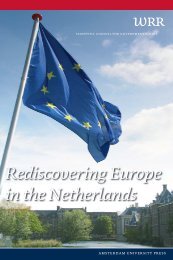The Western Condition - St Antony's College - University of Oxford
The Western Condition - St Antony's College - University of Oxford
The Western Condition - St Antony's College - University of Oxford
Create successful ePaper yourself
Turn your PDF publications into a flip-book with our unique Google optimized e-Paper software.
<strong>The</strong> <strong>Western</strong> <strong>Condition</strong>: Turkey, the US and the EU in the New Middle East<br />
along the East/West divide. This narrative depicted a Manichean struggle between good (the<br />
democratic West) and evil (the totalitarian East).<br />
Beyond the security rhetoric, belonging in the West during the Cold War simply meant<br />
participating in the US-led security framework and the capitalist free market system. Issues <strong>of</strong><br />
democratic governance, civil liberties and human rights tended to become a concern for the US<br />
foreign policy establishment only when these had a bearing on the perceived security and<br />
politico-economic interests <strong>of</strong> the alliance’s key actors. In the frontier regions <strong>of</strong> the East/West<br />
divide, where existing socio-political tensions were exacerbated by superpower rivalry,<br />
authoritarian governments reframed the Manichean narrative to justify their suppression <strong>of</strong><br />
popular demands for political accountability and socio-economic justice. Thus, as long as the<br />
military-controlled state apparatus in Turkey defended the western alliance’s security interests, it<br />
could be excused for routinely intervening in the electoral process, limiting civil liberties and<br />
abusing the human rights <strong>of</strong> its citizens.<br />
Cold War dynamics also built on the existing foundations <strong>of</strong> the Turkish ‘deep state’. As part <strong>of</strong> a<br />
US-led initiative to set up covert ‘stay behind’ paramilitary organisations aimed at resisting a<br />
potential communist take-over <strong>of</strong> NATO member states, a secret counter-guerrilla force was<br />
established within the Turkish military in coordination with the American and British intelligence<br />
services. 136 Nurtured by an ultra-nationalist ideology, and immune from legal constraints and<br />
civilian oversight, these units quickly turned into assassination squads, targeting suspected leftists,<br />
communists and, especially during the 1990s, Kurdish politicians, intellectuals and human rights<br />
activists. It was also during the Cold War era that the Turkish military, the self-appointed guardian<br />
<strong>of</strong> the Turkish republic, staged three <strong>of</strong> its four coups d’état with a claim to ‘restore democracy’ with<br />
the tacit approval (or, as in the case <strong>of</strong> the 1980 coup, direct backing) <strong>of</strong> the United <strong>St</strong>ates. 137<br />
While the end <strong>of</strong> the Cold War brought this arrangement into flux, it did not alter its<br />
fundamental characteristics or dissolve its key institutions. During the 1990s, US – Turkish ties<br />
continued to be driven by strategic concerns. Turkey’s active cooperation in various US-led<br />
military operations, starting with the Gulf War and followed by Somalia, former Yugoslavia, and<br />
after the 11 September 2001 attacks, Afghanistan, underscored the persistent security emphasis<br />
<strong>of</strong> this ‘special partnership.’ And Turkey’s strategic cooperation with the US was compounded by<br />
136 See report by Turkey’s Parliamentary Inquiry Commission on Military Coups and Memorandums (in Turkish),<br />
TBMM Darbeleri ve Muhtıraları Araştırma Komisyonu Raporu, November 2012,<br />
http://www.scribd.com/doc/115000348/TBMM-Darbeleri-ve-Muhtıraları-Araştırma-Komisyonu-Raporu;<br />
Daniel Ganser, NATO’s Secret Armies: Operation Gladio and terrorism in <strong>Western</strong> Europe (London: Frank Cass, 2005);<br />
Serdar Kaya, ‘<strong>The</strong> Rise and Decline <strong>of</strong> the Turkish “Deep <strong>St</strong>ate”: <strong>The</strong> Ergenekon Case’, Insight Turkey, Vol. 11, No.<br />
4, 2009, pp. 99 – 113.<br />
137 CIA’s complicity in the heavy-handed right wing military coup in September 1980 has been acknowledged,<br />
among others, by the agency’s then-Ankara chief Paul Henze. See Mehmet Ali Birand, <strong>The</strong> Generals’ Coup in Turkey:<br />
An Inside <strong>St</strong>ory <strong>of</strong> 12 September 1980 (New York: Elsevier, 1987). Also: <strong>St</strong>ephen Kinzer, Overthrow: America's century <strong>of</strong><br />
regime change from Hawaii to Iraq (New York, NY: Times Books, 2006).<br />
51

















